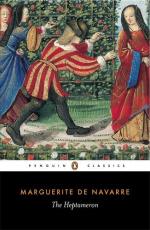to speak truth, was in far more danger of the stake
than most of his friends. The infidelity of Rabelais
is a matter of inference only, and some critics (among
whom the present writer ranks himself) see in his
daring ridicule of existing abuses nothing inconsistent
with a perfectly sound, if liberally conditioned,
orthodoxy. Desperiers, like Rabelais, was a Lucianist,
but his modernising of Lucian (the remarkable book
called Cymbalum Mundi), though pretending to
deal with ancient mythology, has an almost unmistakable
reference to revealed religion. It is not, however,
by this work or by this side of his character at all
that Desperiers is brought into connection with the
work of Margaret, who, if learned and liberal, and
sometimes tending to the new ideas in religion, was
always devout and always orthodox in fundamentals.
Besides the Cymbalum Mundi, he has left a curious
book, not published, like the Heptameron itself,
till long after his own death, and entitled Nouvelles
Recreations et Joyeux Devis. The tales of
which it consists are for the most part very short,
some being rather sketches or outlines of tales than
actually worked-out stories, so that, although there
are no less than a hundred and twenty-nine of them,
the whole book is probably not half the bulk of the
Heptameron itself. But they are extremely
well written, and the specially interesting thing about
them is, that in them there appears, and appears for
the first time (unless we take the Heptameron
itself as earlier, which is contrary to all probability),
the singular and, at any rate to some persons, very
attractive mixture of sentiment and satire, of learning
and a love of refined society, of joint devotion to
heavenly and earthly love, of voluptuous enjoyment
of the present, blended and shadowed with a sense
of the night that cometh, which delights us in the
prose of the Heptameron, and in the verse not
only of all the Pleiade poets in France, but of Spenser,
Donne, and some of their followers in England.
The scale of the stories, which are sometimes mere
anecdotes, is so small, the room for miscellaneous
discourse in them is so scanty, and the absence of
any connecting links, such as those of Margaret’s
own plan, checks the expression of personal feeling
so much, that it is only occasionally that this cast
of thought can be perceived. But it is there,
and its presence is an important element in determining
the question of the exact authorship of the Heptameron
itself.
It can hardly be said that, except translations from the Italian (of which the close intercourse between France and Italy in the days of the later Valois produced many), Margaret had many other examples before her. For such a book as the Propos Rustiques of Noel du Fail, though published before her death, is not likely to have exercised any influence over her; and most other books of the kind are later than her own. One such (for, despite its bizarre title and




